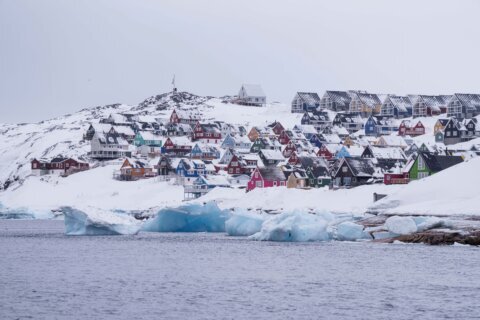WASHINGTON — When did U.S. intelligence learn about Russian plans to take over Crimea?
That question was at the heart of a firestorm on Capitol Hill set off by Arizona Sen. John McCain’s confrontation with Secretary of Defense Chuck Hagel.
During a Senate Armed Services Committee hearing Wednesday, McCain, a Republican, said it was a “massive failure” that the U.S. intelligence agencies did not predict Russia’s activities.
But Director of National Intelligence James Clapper, in an exclusive interview with WTOP, disputed that characterization.
“I have lived through some genuine intelligence failures in my career and this was not a failure by any stretch,” Clapper said.
“We tracked (the situation in Ukraine) pretty carefully and portrayed what the possibilities were and certainly portrayed the difficulties we’d have, because of the movements of Russian troops and provided anticipatory warning of their incursion into Crimea,” Clapper added.
During an expansive interview in his office, Clapper pointed out that, “We were following closely the political and economic developments in Ukraine. We spoke to it in our statement for the record at the time and as the situation unfolded with the Russians.”
On Feb. 22, when Ukrainian President Viktor Yanukovich fled the violent protests against his administration in Kiev and ended up in Moscow, a key question was raised: Was the takeover of Crimea planned by the Russian government?
Putin said the decision to move troops into place in key areas of Crimea was ostensibly to protect Russian interests and ethnic Russians in view of the crisis.
But skeptical foreign policy and national security observers in the West have doubted that claim, and believe it was an opportunistic move to take advantage of the chaos in Ukraine.
The development has raised many questions about Putin’s thought process.
“I think the President of Russia has a view of history since 1945 that is completely at odds with how the rest of the world looks at history,” said former Obama administration National Security Adviser James Jones.
Jones said of Putin, “He believes, and he has said, that the worst thing that has happened in (the 20th century) was the dissolution of the Soviet Union, and he will talk for a long time about why he believes that.”
In a brief 2008 war with Georgia, Russia ended up gaining the territories of South Ossetia and Abkhazia. The similarities in Ukraine have prompted other former national security advisers, such as Brent Scowcroft, who served during the Cold War under U.S. presidents Gerald Ford and George H. W. Bush, to examine whether Putin is trying to reignite the Cold War.
During an exclusive interview with Scowcroft, Jones and Steve Hadley, who served as national security adviser under President George W. Bush, Scowcroft told WTOP, “I don’t think the Cold War is returning. Putin may even be trying to reconstruct the Soviet Union, but I don’t think he’ll be successful. The Cold War was unique and I don’t see it returning.”
Clapper said “Putin is a product of the Cold War. He’s a former KGB officer and I think he has a grand view of greater Russia and he attaches great importance to the ‘Near Abroad,’ which is those countries that were a part of the Soviet Union.”
It’s not a throwback to the Cold War, but it certainly reminds one of the vestiges of the Cold War,” Clapper said.
Not only does Putin believe the crumbling of the Soviet empire was a great travesty but, “the other thing he believes is that NATO is the root of all evil,” Jones said.
Hadley agreed, and pointed out that Putin has tried to construct mirror-image institutions in Russia to compete with those in the West such as NATO and the European Union.
“Putin, to a great extent,” said Hadley, “does not like the outcome of the Cold War and in some sense is trying to rewrite the rules that came in place at that time.”
Those rules according to Hadley were: “Respect the sovereignty of states; no use of force against neighboring states; and every state could choose what alliance relations it wanted.”
Hadley says Putin is not satisfied with those rules, and “is trying to construct a Soviet empire, but a Russian empire.”
It is believed that the possibility Ukraine might align itself with the European Union precipitated the dramatic movement of Russian troops into Crimea. But Clapper was quick to point out that “there were already 18,000 troops there” on Russian military bases.
The three national security advisers and others have established that Putin is a smart, savvy, but unpredictable individual at times, and while Clapper disputes the notion of a failure of intelligence in recognizing what was going on in Crimea, he says that kind of finger-pointing caters to the impossibly high bar intelligence agencies often face.
“I think it’s a good idea to distinguish between secrets and clairvoyance, and I think too often the intelligence community is held to same high exacting standards for divining both,” Clapper said.
Follow @JJGreenWTOP and @WTOP on Twitter and WTOP on Facebook.







